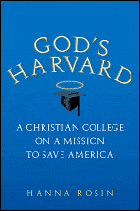
God’s Harvard: A Christian College on a Mission to Save America By Hanna Rosin. Harcourt. $25.00
Journalists have always had trouble covering evangelical Christians. It’s not for lack of interest: If anything, we’re a little too fascinated. We gleefully report on the strange customs of this peculiar tribe. Their families have 20 kids! They home-school their kids! They think Harry Potter is satanic! The weirdness of evangelical Christians has become something of a cultural cliché. And considering that one-third of the population identifies as evangelical, the cabinet-of-Christian-curiosities approach to covering this community is quickly getting reductive.
Enter Hanna Rosin, author of God’s Harvard: A Christian College on a Mission to Save America. Rosin, a religion reporter for the Washington Post, spent 18 months at Patrick Henry College, a seven-year-old evangelical institution in northern Virginia whose mission is “to prepare Christian men and women who will lead our nation and shape our culture with timeless biblical values and fidelity to the spirit of the American founding.” (The college is named for the revolutionary war figure Patrick Henry, of “Give me liberty or give me death” fame). To be sure, Patrick Henry students have some of those evangelical traits we love to point and stare at: They don’t date—instead they “court” (lots of parental involvement, zero making out); their DVD collections and iTunes playlists are carefully monitored by school officials for “inappropriate” content; and the dress code is serious business—cargo pants, sweatshirts, flip-flops, and bare midriffs are strictly forbidden.
But what makes Patrick Henry different from secular colleges isn’t the focus of God’s Harvard—what makes it the same is. Students read the Bible in class, but they also read Plato, Kant, and Nietzsche. They’re not just future missionaries and preachers; they’re also aspiring politicians, filmmakers, dancers, and thespians. A good number of Patrick Henry alums have gone on to work at GOP think tanks, as White House aides, or as interns for prominent Republicans like former Virginia Senator George Allen and Karl Rove. In a few short years, the college has earned the reputation as a Capitol Hill feeder. “Be in the world, but not of it” is a popular catchphrase among evangelicals. At Patrick Henry, it’s more like, “Be in the world, and run it.”
Exactly how to accomplish this goal is the subject of some debate at Patrick Henry—and that’s where Rosin’s story gets interesting. Michael Farris, the college’s founder, advocates arming students against secular culture. “I don’t care what Plato says,” he quips in a speech to the incoming freshmen and their parents. “We don’t need the world’s knowledge and information to guide us. This is opposition research.” Farris bristles when faculty members fail to imbue their lectures with a Christian moral.
But during Rosin’s time at Patrick Henry, a group of faculty members begins to wonder: What is so unchristian about critical thinking? Government professor Erik Root, a favorite among some Patrick Henry students and a kind of ringleader of the more fed-up faculty members, elicits Farris’ wrath by citing “a Darwinian” in the student newspaper. Later, Root wonders, “Is there a future for the evangelical college? Or is it an oxymoron?” Near the end of the book, when the administration begins to monitor Root’s lectures, three of his students stand on their desks and recite Walt Whitman’s “O Captain, My Captain” in protest. (Apparently Dead Poets Society is on the list of approved DVDs.) The campus turmoil isn’t helped by the fact that the conservative Republican candidates that the school supports are beginning to lose. It’s 2006, the tide is turning in Washington, and some at Patrick Henry wonder if its moment is over.
At times, Rosin can’t quite stomach Christian campus culture. The college seems largely untouched by the winds of feminism. Administrators encourage students to be ambitious, but women who are too career-oriented are called “political animals” and “red leather stiletto girls” by their peers. Rosin finds this double standard irksome, and so do the female students who move off campus, where, she says, “there are no room checks, so you don’t have to compete for future housewife of America.” Occasionally, Rosin’s frustration with Patrick Henry’s dogma gets the better of her, and she resorts to heavy-handed descriptions. At one point, she refers to one student’s “newly whitewashed room of a brain.”
But in the end, Rosin has spent too much time with Patrick Henry students to portray them as one-dimensional. The fun of God’s Harvard is in Rosin’s perspective—it’s clear that although she doesn’t always agree with the kids, she likes them. With big-sisterly affection, she chronicles student Derek Archer’s transformation from awkward, fresh-out-of-home-school freshman into comfortable, confident sophomore. (“He’d gotten a cell phone, and he was using it to carry on a fairly regular conversation with a girl.”) The book is richer for the real relationships she’s formed. As a secular reporter trying to understand an evangelical campus, Rosin is actually in a perfect position to empathize: She’s in a world dramatically different from her own, but not of it.
















